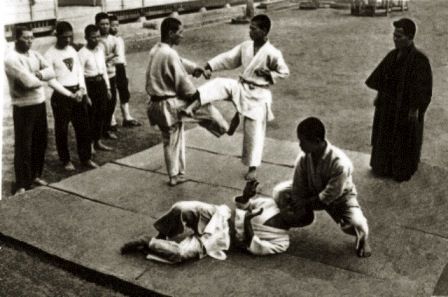ballen0351
Sr. Grandmaster
Im not the one thats confused. So all ground fighting just appeared in 1993 by the gracies prior to that there was none huh? So thousands of years for Wrestling didnt exist?,Where exactly did it exist prior to 1993? Outside of Bjj ground fighting was largely non-existent in the MA world. Again, judo had all but abandoned newaza because of Olympic rules and Other MAs weren't teaching ground fighting in any form whatsoever. So where's the confusion?
Where do you think the Gracies learned it from?
You KNOW nothing thats the problemI know that your teacher wasn't teaching ground fighting utilizing traditional Okinawan MA.
Nothing lost about it. Its always been there. Nobody claimed Goju was only ground fighting. But there is ground fighting techniques, in Goju. Not to the lvl of BJJ because its not Goju's focus. In comparison to BJJ its very elementary but its there and has always been there. Its also effective against normal people. Would I try to out ground fight a BJJ guy with what I learn in Goju of course not. Id use other techniques from in close stand up. Which is what Goju is good at.Again, Newaza was rare in Judo prior to the late 90s, and even at that point they really didn't think it was useful for their goals. So you'll forgive me if I don't believe that your Goju instructor was teaching the lost art of Okinawan ground fighting to his students.

Here is a photo of ground controlling someone. Its the end of a Bunkai used to defend a single leg takedown
And? Nobody said BJJ was bad. Its great for what it is. BUT its not the ONLY ground game that ever existed as you seem to think.Which is why traditional MA schools across the country are actively including Bjj and grappling into their curriculums?
